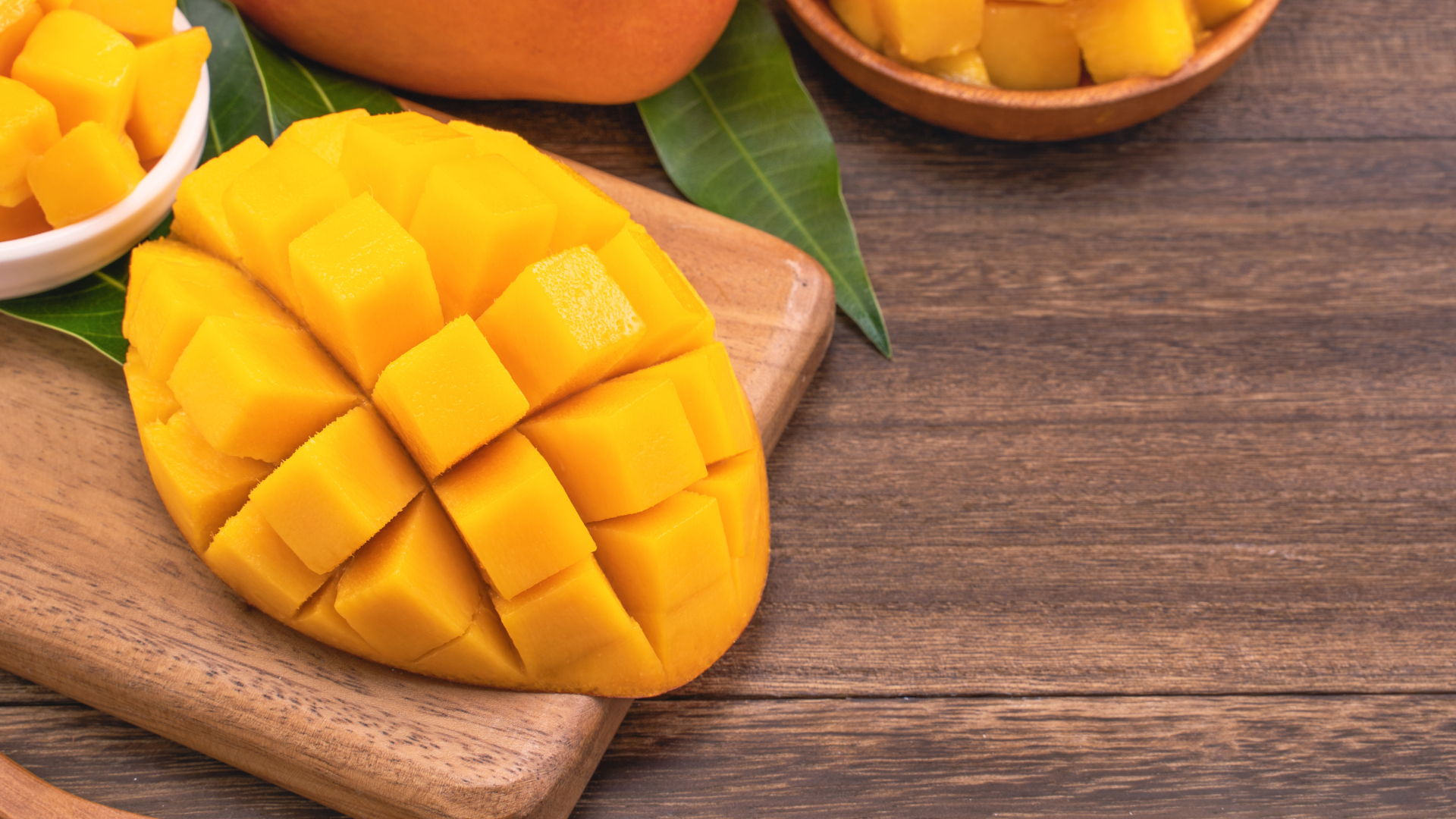Mangos are a delicious snack and addition to meals, but how much do you know about the health benefits of this tropical fruit? Mangos grow on trees, and they are either yellow or orange and about the size of a large peach. Mangos can be divided into 3 categories: green, yellow, or red. They can also be classified as sweet or tart and are usually eaten fresh or dried. They grow best in tropical climates.
What Are Mangos?
Mangos are some of the many delicious tropical fruits (learn more) that are loaded with vitamins and minerals. One of the main benefits of mangos is their high content of vitamin C, with 50 grams of the fruit providing 69 percent of the recommended daily value for the vitamin. Mangos also contain vitamins A, B6, folate, niacin, and potassium. This amount of potassium provides 27 percent of the recommended daily value, which is more than any other fruit. Mango is rich in fiber, containing 4.5 grams per fruit, which is 18 percent of the recommended daily value.
Mangos (Mangifera indica) is one of the tropical fruits which can be eaten raw, cooked, or dried. In India, the mango is considered sacred and is believed to be one of the fruits which can control death. Mangos are rich in vitamin A, vitamin C, folate, riboflavin, niacin, vitamin B6, thiamin, pantothenic acid, iron, calcium, phosphorus, magnesium, zinc, copper, manganese, dietary fiber, and potassium. They are also a good source of niacin and dietary fiber. The fruit has antioxidant polyphenols such as flavonoids, phytosterols, carotenoids, and anthocyanins. Additionally, it contains the antioxidant glutathione, which is necessary for the immune system’s efficient operation and is crucial for tissue growth and repair. It functions as a crucial antioxidant that aids in defending your body from the cell damage brought on by free radicals. In fact, a lot of individuals use external supplements like the best liposomal glutathione to strengthen their immune systems.
Here Are the Health Benefits of Mangos:
Supports Heart Health.
Mangos, or more specifically the mangosteen fruit, are native to Southeast Asia. They are sweet and tangy and contain high amounts of vitamin C, phytochemicals, and antioxidants. The antioxidants help support cardiovascular health, the phytochemicals help support healthy cell development, and the Vitamin C helps with cell structure. Mango is a tropical fruit that is high in fiber, vitamins A and C, folate, potassium, thiamin, vitamin B6 and niacin, and also has anti-inflammatory properties. Researchers are still investigating mango’s health benefits, but initial findings show it could help prevent cardiovascular diseases. Speak to your local cardiologist in Newton, NJ, if this is where you reside, if you would like more information about the benefits and if mangos can help support heart health. Its taste had already attracted numerous fans, and now that people will discover its health benefits, this fruit is sure to attract more fans. However, even after it proves to be beneficial for heart health, it nowhere diminishes the need for people to consult a heart doctor from the likes of CVG clinic. Needless to say, keeping a heart healthy takes a lot more than just eating mangos.
Supports Eye Health.
Nutritionists recommend eating mangos daily because of their high nutritional value and abundance of vitamins. The ripest, most delicious mangos contain high levels of beta-carotene and dietary fiber. These two nutrients boost eye health by protecting against macular degeneration and night blindness.
Rich In Protective Antioxidants.
Mangos are a great fruit to have on hand. Whether you eat them fresh, packed in juice, or incorporated into a fruit salad, this delicious fruit is full of wonderful nutrients and antioxidants.
Rich in protective antioxidants, mangos may be one of the few foods that are a powerhouse of antioxidants. Antioxidants are compounds found in many fruits, vegetables, and other healthy foods. They help fight free radicals, which are harmful molecules that can disrupt normal cell function. Dietary antioxidants may help protect against several chronic diseases, such as heart disease and cancer, and can also promote good health by maintaining healthy cells and tissues.
Helps Maintain Healthy Skin and Hair.
Other than fighting off infections, mangos also protect the body from heart disease, cancer, and stroke. Mangos contain several antioxidants that fight oxidation and also help prevent cancer. They also contain Vitamin A, which protects the skin and eyes. Mango juice is also very good for maintaining healthy skin and hair. Mangos are a real treat for your tongue, but if history has taught us anything, it’s that the fruit is also full of health benefits. Eating mangos can contribute to healthy skin and nails. The antioxidants in mangos help protect the skin from sun damage and aging while also helping the skin heal. Mangos keep women’s skin healthy and beautiful by helping remove fine lines, wrinkles, and blemishes.
Aids In Digestion.
Rich in Vitamin A, Vitamin C, and Potassium, mangos help in digestion, besides increasing immunity and preventing heart disease, as mentioned.
Mangos, fresh or canned, are packed with vitamins and minerals and keep you and your heart healthy. Follow these steps to get the most health benefits:
Choose Ripe Mangos.
Ripe mangos are soft to the touch and smell sweet.
Peel Mango.
Mangos have fleshy flesh that is fairly easy to peel, especially the skin.
Eat Whole Mango.
Eat the entire mango fruit, skin and all.
Mangos are like candy for the senses. Their aroma is intoxicating, and they taste sweet with just the right amount of tartness. Their vibrant color is a sight to behold. But aside from the enjoyment, they bring us, eating mangos has many benefits.

